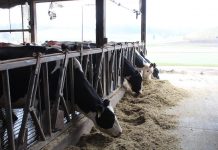During the past six weeks, I have been on the road helping to teach the OSU income tax schools.
These workshops help teach tax professionals about the latest changes to the IRS tax codes. I had the opportunity to teach the agriculture portion of these schools and today I would like to share some of the agricultural questions that have been asked, which may be helpful as our local farmers and landowners plan for completing their 2012 taxes.
Because of our summer drought conditions, I am receiving an insurance payment this year. Can I postpone reporting my insurance payment until 2013?
Taxable income
Generally, farmers who use the cash accounting method must report income in the year in which they receive it. In 2012, this could create a bunching of income for farmers. If they receive an insurance or disaster payment for their 2012 crop before the end of the year, this could lead to sizable taxable income because they already have reportable receipts from selling their 2011 crop in 2012.
So what can farmers do? Thankfully, the Internal Revenue Service understands how farmers sell crops and allows for the postponement (for one year) of reporting compensatory payments received for crop loss under IRC section 451(d).
Generally, this exception applies when crops cannot be planted or are damaged or destroyed by a natural disaster such as a drought or flood. To qualify for the exception, a farmer must use the cash method for accounting and must show that it is his or her normal business practice to report more than 50 percent of the crop income in the year following the year it was grown.
More resources

The election must cover all eligible crops from a single farming business. More information on this issue can be found at: http://ohioagmanager.osu.edu/tax-management/can-i-defer-my-2012-crop-insurance-check/.
Are there any strategies farmers can use to reduce their potential tax burden? Farmers can use a variety of methods to reduce their liability. This may include using bonus depreciation. The additional first-year depreciation rules allow farmers to deduct on their 2012 income tax returns 50 percent of the cost of qualifying new equipment purchased.
The additional first year or bonus depreciation is set to phase out in 2013. Similarly, I.R.C. 179 expensing allows farmers to elect to deduct part or all of the cost of qualifying farm assets in the year they are placed in service.
The deduction is limited to $139,000 for 2012 and drops to $25,000 for 2013. New and used equipment is eligible for this deduction.
Additional strategies include purchasing 2012 inputs in advance or utilizing Farm Income Averaging to borrow unused tax brackets from the three prior years.
Postpone sales
Farmers can also postpone sales of raised commodities or use deferred-payment contracts to delay receipts into 2012. More information on these items can be found at: http://ohioagmanager.osu.edu/uncategorized/section-179-bonus-depreciation-and-tax-strategies-2/.
What are some good sources of tax advice and information for farmers with questions? A great location to find agricultural tax advice is through the new agricultural tax website at www.RuralTax.org.
This website provides with a source for agriculturally related income and self-employment tax information that is current and easy to understand. Producers should also watch for tax articles on OSU Extension’s Ohio Ag Manager website located at http://ohioagmanager.osu.edu.
Producers who prepare their own taxes should plan on attending OSU Extension’s Agricultural Tax Issues Update, which will be held in Jefferson, Ohio, Monday, Dec. 17.
More information about this update can be found at http://incometaxschools.osu.edu/. And last but not least, the Farmer’s Tax Guide is an excellent resource and it can be found at: http://www.irs.gov/pub/irs-pdf/p225.pdf.
***
I would like to end today’s column with a quote from Laurence Peter who stated, “America is a land of taxation that was founded to avoid taxation.” Have a good and safe day!
David Marrison is Extension Educator, Agriculture & Natural Resources, Ohio State University Extension. Mr. Marrison can be reached at 440-576-9008 or marrison.2@osu.edus
STAY INFORMED. SIGN UP!
Up-to-date agriculture news in your inbox!













